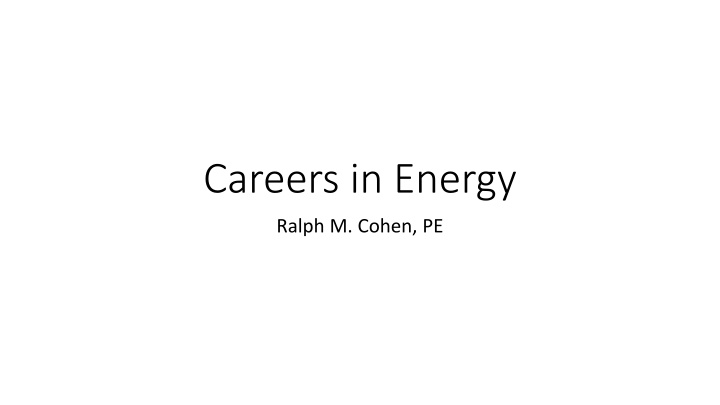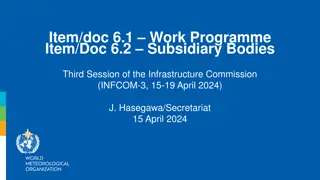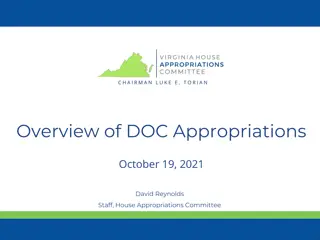
Exploring Careers in Energy with Ralph M. Cohen, PE
Discover insights from Ralph M. Cohen, a retired mechanical engineer turned energy consultant, specializing in energy conservation and industrial development. Learn about the different sources of energy, including wind, hydro, and thermal energy, as well as the diverse career opportunities in energy utilization.
Download Presentation

Please find below an Image/Link to download the presentation.
The content on the website is provided AS IS for your information and personal use only. It may not be sold, licensed, or shared on other websites without obtaining consent from the author. If you encounter any issues during the download, it is possible that the publisher has removed the file from their server.
You are allowed to download the files provided on this website for personal or commercial use, subject to the condition that they are used lawfully. All files are the property of their respective owners.
The content on the website is provided AS IS for your information and personal use only. It may not be sold, licensed, or shared on other websites without obtaining consent from the author.
E N D
Presentation Transcript
Careers in Energy Ralph M. Cohen, PE
About me Mostly retired mechanical engineer Have been an engineering consultant for 15 years; specializing in energy conservation, factory reliability, and industrial product development Previously worked for Intel and Texas Instruments designing and building mechanical systems that used large amounts of energy making chips (microprocessors and memory) used in computers, etc. One factory = 40 megawatts power = power for ~ 50,000 houses Also worked in air pollution control and design of factories making glass for TV s and fiber optics for communication all used significant energy Enjoy low energy boats, motorcycles, bicycles, and E-bikes Ralph M Cohen Consultancy 2
Energy in everyday life Has the class learned about Where electricity comes from? Getting electricity from wind? Getting electricity from rivers and dams? Getting electricity by burning fossil fuel? Getting electricity from the sun? Has the class learned about Using electricity in homes, transportation, factories? Ralph M Cohen Consultancy 3
How/where does energy come into daily life? We don t create energy, we only harness what already exists and convert it to a useful form Wind turns propeller that turns electric generator that powers homes, etc. Natural gas burns to produce heat that warms houses or turns electric generator that powers homes, etc. Gasoline burns in engines that turns wheels of car through gearbox Electricity charges lithium ion batteries to run cars or computers Electricity turns electric motors that run pumps and fans in factories and homes. Dams on rivers cause water to flow through turbines that turn electric generators Energy comes from many sources and is applied to run many things Ralph M Cohen Consultancy 4
Wind Energy Images from Wikipedia and Portland State University Ralph M Cohen Consultancy 5
Hydro energy Ralph M Cohen Consultancy 6
Thermal Energy Ralph M Cohen Consultancy 7
Careers in every aspect of energy utilization Manufacturing equipment electric motors, engines, wind turbines, pumps, fans, vehicles, electric transformers, boilers, refrigeration System design engineers: cooling, heating, gas transmission, electric power transmission Planning/locating city building departments and industry Installation/construction electricians, welders, pipe fitters, instrumentation Operations running complex systems or equipment Service/Repair technicians (electrical, mechanical, instrument, machinists, welders) Marketing/sales technicians/engineers Ralph M Cohen Consultancy 8
Fastest growing energy related jobs Wind turbine service techs (7% growth rate), 6,900 employed (2020) (480) Solar voltaic system installers (5% growth rate) 7,700 employed (2021) (385) Derrick operators oil and gas (<1% growth rate), 11,100 employed (111) Rotary drill operators oil and gas (8% growth rate), 15,650 employed (1268) HVAC technicians (1.5 3% growth rate), 330,000 employed (7425) Electricians (1% growth rate), 625,000 employed (6250) Source (2020): https://www.workrise.com/hub/the-5-fastest-growing-skilled-trade- jobs-in-energy/ Ralph M Cohen Consultancy 9
Key questions from your teacher How long have you been in this position/industry/field? 34 years as employee, 16 years as a solo consultant Since graduating college, worked for 6 companies as an employee, 15 companies as a consultant What led you to your current career/job? Engineering around mechanical things from early age, magically drawn toward Semi-conductors challenging, interesting, next big thing (45 years ago), chance to be creative Ralph M Cohen Consultancy 10
What is a typical work week like? Calculations, sketching ideas, walking construction site, solving problems, working with suppliers, designing experiments, participating in meetings, reviewing designs, writing reports, mentoring junior engineers, working at projects around the world What do you like best/least about your job? Why? What (best): Continuous improvement, challenges, problem solving, creating something new, variety, working with wide range of people, exposure to other cultures, sense of accomplishment What (least): Sometimes away from family for extended periods (weeks), long hours, deadlines Why: Exciting career, cutting edge, able to see the impact of my work quickly Ralph M Cohen Consultancy 11
What type of interests, abilities, and skills would help a person to be successful in your occupation? Interests: engineering or science involving energy, e.g. Power, Petroleum, Mechanical, Electrical, Chemical, Mining, designing/creating/analyzing, making the world better Abilities/skills: problem solving, creativity, math/science, using computer as a tool, writing/communicating clearly, team player, work to a schedule Similar for technicians and trades but less theory and more applied Example: Engineer why does water flow through pipe? Plumber how do I stop the leak? What type of education/training, technical knowledge, or experience is necessary for this kind of work? Associate degree in technology, Bachelors/Masters degree Apprenticeship or trade school electrician (big & small wire), welders, plumbers, fitters, machinists, sheet metal workers, steel erectors, IT/programmers Ralph M Cohen Consultancy 12
How do you use math, reading, writing, business, technology, science, and foreign language skills in your daily work? Foreign language helpful if working out of US or where English is not the primary language All others used daily Excel, Word, Powerpoint, CAD programs (e.g. SolidWorks, Inventor, Revit, AutoCAD), Modeling programs (EnergyPlus, eQuest), Internet What advice would you give a student interested in this career? Load up on science and math in HS and study hard, but don t neglect other courses/activities Get a summer job related to an energy field Build things (at home or in school lab) in the energy field, e.g. movie clip - Spare Parts https://www.youtube.com/watch?v=6ldKc6yXTyg Learn to use a CAD program Keep your engineering/science education broad; not narrowly focused Ralph M Cohen Consultancy 13
What type of starting position and salary would someone entering in this field be most likely to find? Mechanical Engineering range: $68K average starting ($45K - $120K+) Positions: Junior engineer reporting to an experienced engineer, but expected to make some independent decisions HVAC Technicians (slide 19): $49K average ($40K - $57K for 25% - 75% range) Electricians $59K average ($42K - $74K for 25% - 75% range) Do you have to depend on others in order to accomplish your job? Do you work in teams? Yes and yes Teams are more productive than individuals because each team member brings their unique talent and understanding to the problem Ralph M Cohen Consultancy 14
Has technology changed your job? What changes do you see in the future? When I graduated college, there were no calculators or laptops, just the slide rule Technology has made work easier and faster but have to do more! More women and people of color going into engineering (women: 20% college, 13% workforce) Less travel, more virtual meetings, more advanced design/construction tools Growth in green /renewable energy sources/limits on greenhouse gas emissions Are there other industries or positions where you could work with your skills/expertise? Other types of building design (hospital, office, university) Other types of factory design (medical products, photo voltaic, batteries, power plants) Ralph M Cohen Consultancy 15
What are the opportunities for advancement in this occupation? Engineering: Individual contributor > team leader > department manager > facility manager > vice president of corporate facilities Technician: Junior tech > senior tech > supervisor; + 4 yr. tech degree = engineer Sometimes entrepreneur / company owner What part-time jobs, internships or extracurricular activities would best prepare you for this occupation? Me: Farm work, auto/motorcycle mechanic, quality control inspector, construction site laborer; team sports, other activities (yearbook, newspaper), residence maintenance) Internship: if you can find one anything that puts you in an environment where you can learn something about the practical aspects of engineering. For example, Intel offers college interns (paid) a 2 month project studying a small problem. Ralph M Cohen Consultancy 16
Example: HVAC Technician Duties and Responsibilities Travel to homes and businesses as scheduled Determine customer concerns with their current HVAC system Inspect current HVAC systems for effectiveness and safety Perform necessary repairs and routine maintenance Install new heating, cooling, and ventilation systems Maintain accurate inventory of all equipment and HVAC resources prepared by Ralph M Cohen Consultancy 17
HVAC Technician (cont) Requirements and Qualifications Completion of an HVAC training program at a vocational school or apprenticeship Current state HVAC technician license Certification through the Environmental Protection Agency to handle refrigerants is required Proficient with manual and power tools Valid driver's license and reliable transportation to shop/office Reliable and self-motivated prepared by Ralph M Cohen Consultancy 18
Entry Level HVAC Technician Salary - USA (ref: https://www.ziprecruiter.com/Salaries/HVAC-Technician-Salary) Hourly pay Annual Pay Monthly Pay Weekly Pay Top Earners $68,000 $5,666 $1,307 $33 75th Percentile $56,500 $4,708 $1,086 $27 Average $49,242 $4,103 $946 $24 25th Percentile $39,500 $3,291 $759 $19 prepared by Ralph M Cohen Consultancy 19
Wind turbine Technician II Typical Qualifications A High School Diploma with applied mechanical, electrical, hydraulics, or equivalent experience. College Diploma or Technical School Certificate beneficial. As a Level II technician, 1-2 years of relevant work experience and minimum qualifications related to wind turbines: Competent and qualified with Troubleshooting (basic and advanced) Competent and qualified with Turbine electrical switching and SCADA Understanding of wind power related systems, including, pneumatics, hydraulics, gearboxes, electrical, mechanical and power plant systems. Ability to read, interpret and understand drawings & schematics. Good interpersonal and collaborative skills Strong attention to detail Proven problem solving and time management skills Ralph M Cohen Consultancy 20
Sample of other Technician career options Finding a career in the trades (woman becomes a welder) https://www.trane.com/commercial/north-america/us/en/about- us/newsroom/blogs/haley-whiting-paving-the-way.html Wind turbine job openings (tend to require experience): https://vestaswindtech.com/?utm_source=google&utm_medium=search&utm_ca mpaign=wind_turbine_technicians&gclid=EAIaIQobChMI75S_h- qT9AIVDT2tBh0yCg4kEAAYAiAAEgKHo_D_BwE Electrical apprenticeship details of the process https://nietc.org/applicants/apprenticeship-programs/limited-energy-a-technician/ Ralph M Cohen Consultancy 21



